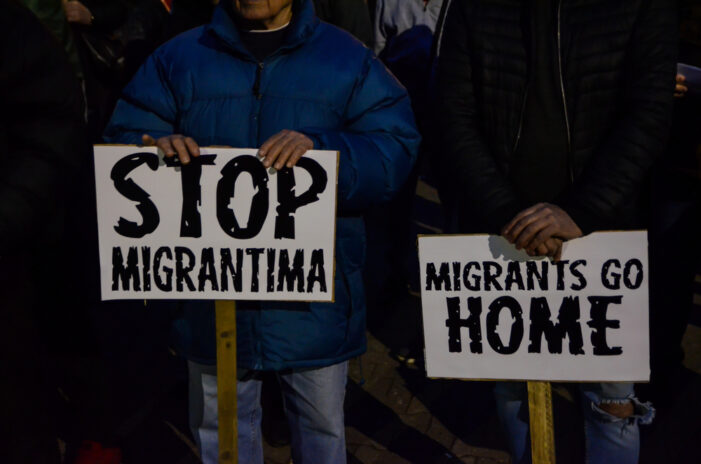By AV PRESS RELEASES
Washington, DC – Below is a column by Maribel Hastings and David Torres from America’s Voice en Español translated to English from Spanish. It ran in several Spanish-language media outlets earlier this week:
This week the governor of Florida, Ron DeSantis, announced his intention of seeking the Republican presidential nomination in 2024, and immigrants will once again become political conservatives’ favorite scapegoat. This with the goal of feeding their extremism and that of their base, without offering real solutions to our decomposing migration system.
On June 16, 2015, Donald Trump descended the escalator of Trump Tower in New York to make his candidacy official, labeling Mexican immigrants as “criminals” and “rapists.”
It’s obvious that the rhetoric of both Republicans is united with a common thread that increasingly solidifies the conservative forces on the extreme right, and is nothing other than the utilization of racism and xenophobia for mere political-electoral goals. So much so that when they are in power they even turn it into public policy, with a framework and media approach based in fear.
DeSantis is throwing his hat into the ring supported by none other than Elon Musk, the head of Twitter who is prone to disinformation and conspiracy theories, and with an anti-immigrant law in tow that goes live on July 1, and is already generating all kinds of concerns, from its economic to humanitarian and civil rights impacts.
The first can be measured in actual terms when the new law is in place, although the news media has already been reporting the abandonment of Florida’s fields and construction sites, especially where the workforce is predominantly immigrant. Discrimination and harassment, on the other hand, will also be constant, especially by those who have aligned themselves with one of the most anti-immigrant laws in the history of the United States.
And although the advantage DeSantis had over Trump among Republican voters’ preferences has faded, the reality stays the same. The two figures that today are battling along the Republican Party road are proven anti-immigrant actors. One, Trump, used the presidency and the advice of extremist aides like Stephen Miller to lead one of the harshest and cruelest crusades against immigrants, even separating babies from their mothers, many of whom have still not been reunited.
DeSantis, a student of Trump who fell from his grace, is another anti-immigrant figure who has declared a culture war on a multicultural state, Florida, meddling even in which textbooks schools should assign, in women’s reproductive rights, and the rights of the LGBTQ+ community.
Both Trump and DeSantis have shown themselves to be among the clearest examples of that profound division between the idea of the United States as an inclusive nation, multicultural and tolerant, and a racist, xenophobic, and anti-immigrant country. The two are betting on taking the U.S., at both the state and national levels, away from its core as the axis of liberties and towards the threshold of intolerance, as other characters in other latitudes have done, leading their societies and the world into a blind alley.
Moreover, in addition to his corporate war on Disney that is already costing the state millions of dollars, DeSantis is repeating in Florida what other Republican-led states like Arizona in 2010 and Alabama in 2011 did with no success: try to become the epicenter of the war on undocumented immigration.
What Arizona and Alabama immediately learned is that there is a huge gap between rhetoric and reality, and that as much as they want to make it appear, in their myopia, that they could rid themselves of undocumented immigrants with the snap of a finger, their states would be the ones suffering serious consequences, particularly in the economy.
In Alabama, for example, HB 56 was curiously passed almost 12 years ago, on June 9, 2011. One of its immediate effects was the exit of undocumented immigrants from the jobs they occupied, especially in farming. America’s Voice en Español reported first hand the desperation of farmers, seeing their harvests rotting in the fields for the lack of labor that then-governor, Republican Robert J. Bentley, demonized through a measure largely written by one of the most anti-immigrant figures in the country, Kris Kobach, then Secretary of State in Kansas and today the Attorney General of that same state.
We saw first-hand how businesses where migrants shopped for groceries and clothing, where they got their hair cut, or took their cars to be washed or fixed, lost thousands of clients overnight.
We also saw the direct impact on the U.S. citizen children of undocumented parents. Some, for fear of being detained and deported, stopped sending their citizen kids to school, even the doctor—including when they were sick—which generated worries among public health groups.
This is a frightening scenario that is expected to occur again, now in Florida, once again affecting the most vulnerable populations in the country, among them in first place, of course, undocumented immigrants and their families, those who these types of laws treat with disdain, despite the economic benefit their work represents in order to strengthen the finances of the states where they live and work assiduously.
To not see this now is to fall into that age-old trap of societies in decline: those who don’t know their history are condemned to repeat it.
So when an anti-immigrant law is passed, like DeSantis just did—with the only goal of showing the base of his also anti-immigrant political rival, Donald Trump, that he can be as or more cruel than their leader—reality doesn’t delay its historical lessons, the ones that a stubborn and foolish Republican Party seems to have not learned.
To read the Spanish version of this column click here.

